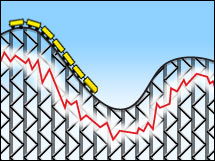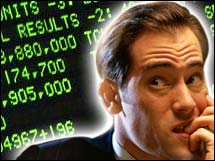As Wall Street quakes, Silicon Valley yawnsLast week's unexpected market plunge has made a lot of people nervous - but not in the tech heartland. Business 2.0 Magazine's Chris Taylor reports.(Business 2.0 Magazine) -- A funny thing is happening in Silicon Valley. As white-knuckled investors fear the worst from the stock market's recent hiccups and the media trots out de rigeuer photos of bald Wall Street traders breaking out in a sweat, the next generation of entrepreneurs keeps quietly working on the next big thing in garages and dorm rooms. Silicon Valley is far different place than it was seven years ago when the dotcom bubble burst. You see, unlike the rip-roaring days of 2000 when countless twentysomething-ers and wannabe day traders bet heavily on rising stocks, Silicon Valley no longer needs Wall Street.   What it needs are the four cash-rich superpowers (Google, eBay (Charts), Yahoo, Amazon (Charts)), a handful of lesser powers with profitable niches (like Salesforce.com (Charts)), and the vast co-dependent kingdoms that each has opened up for aspiring entrepreneurs. Sure, Google's (Charts) stock price was bruised in last week's market roller coaster, falling from its $500 highs in January to around $440 a share last Friday. But what really matters to young turks today is the Internet search giant's $18.5 billion in cash and cash equivalents. Who wants to be at the mercy of fickle investors when a flush company like Google can buy them? That's the smart bet YouTube's Chad Hurley made. Mark my words: for all the talk of a Web 2.0 bubble that's bound to burst, the 2000s will be remembered as the decade in which the business landscape became suddenly stable for Internet companies. For this, we have the dotcom disaster to thank. To most, the years 1995 to 2000 offer a cautionary tale of what happens when you buy into investors' image of yourself. Dumb business ideas were rewarded with million-dollar valuations, so entrepreneurs kept coming up with yet more dumb business ideas. (You remember Pets.com and Webvan, but how about Gazoontite.com, which sold asthma and allergy remedies, or OurBeginning.com, which hawked its customized wedding invitations during the Super Bowl?) Yet as time has since told, many of these ideas weren't as dumb as they once looked; they were simply 10 years ahead of their time. Remember when everyone lampooned broadband TV in the late 1990s? Now we're all addicted to YouTube. And while the original Pets.com is dead and buried, its now owned by onetime rival Petsmart.com, which continued to grow and now earns about $30 million on $1 billion in sales every quarter. But even this revisionist view of dotcom history points out that the villain of the piece was Mammon all along. Open yourself up to the irrational exuberance of the market before you've got a defensive bulwark like Google, and you're asking for trouble. What Wall Street gives, Wall Street can just as easily take away. It's not far-fetched to say that the vast public market failure of 2000 was the best thing that ever happened to the tech industry. It impressed upon an entire generation of entrepreneurs the dangers of being too greedy. Consider Joshua Schachter, creator of one of the earliest Web 2.0 success stories Del.icio.us. He took little more than $1 million in seed funding - chump change by 1990s standards - despite having a couple of VC backers who wanted to throw far more cash at him. Schachter eventually sold Del.icio.us to Yahoo (Charts) for $20 million rather than face the slings and arrows of the public market himself. As Michael Copeland wrote last month (see "Venture Funds Go To Seed"), so many entrepreneurs are thinking small that VCs are adjusting to the new landscape by making lots of $20,000 bets rather than a few multi-million dollar ones. No one wants to be the next Pets.com. Everyone wants to be the next Del.icio.us. And they're happy to live frugally while tinkering with their startup. Some are skipping the funding stage altogether. With online distribution so cheap and advertising dollars so easy to come by, all an entrepreneur needs these days is a computer, a webcam and a nifty idea - build your site, and the money will come. The video blog Rocketboom, with one employee, one paid host per episode and hundreds of amateur correspondents, made $250,000 last year, 90 percent of it in advertising. Ask A Ninja, a video podcast featuring nothing but a guy in a ninja costume answering questions, recently struck an advertising deal worth $300,000 a year. With business like this, who needs the stock market? Perhaps all of this online ad money is just the modern equivalent of investors' irrational exuberance. But it seems unlikely. American companies still spend more money advertising themselves in the Yellow Pages than they do on the Internet (and how much time do you spend flicking through those hefty, musty old books every day?) Sure, a market crash followed by a recession would slow considerably the ad dollars that are now flooding the Internet - not to mention lifting many Valley boats. But what would, say, Google do in this instance? It would want more than ever to balance out its core search advertising business. And it would do so by digging into its cash hordes to buy even more tiny startups with smart ideas. No wonder Silicon Valley startups would rather gamble on a respectable ad deal or a Google buyout than on a white-knuckled ride on the NASDAQ's roller coaster. We can hardly blame them. ________________________________________ More from Chris Taylor's Future Boy: Why commercial Wikis don't work Ocean real estate: The next boom? To send a letter to the editor about this story, click here. |
Sponsors
|
